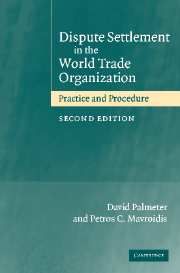8 - Remedies
Published online by Cambridge University Press: 05 March 2012
Summary
General
Public international law has long recognized the duty of governments to repair or remedy damage they have caused. The Permanent Court of International Justice stated the principle in the Factory at Chorzów case: “Reparation must, as far as possible, wipe out all the consequences of the illegal act and re-establish the situation which would, in all probability, have existed if that act had not been committed.” In its first decision, the Corfu Channel case, the International Court of Justice awarded damages to the United Kingdom as compensation for injury incurred. The Draft Articles of the International Law Commission on State Responsibility provide that, “The responsible State is under an obligation to make full reparation for the injury caused by the internationally wrongful act.” GATT practice with regard to remedy was, for the most part, very different. WTO practice, thus far, is different as well, but it appears to be an evolving practice, the final shape of which is yet to appear.
GATT practice
Practice under the GATT with regard to remedies was inconsistent. Panels usually recommended that the offender bring its measure into conformity with the relevant provision of the General Agreement or the relevant Tokyo Round Code. This remedy usually was prospective only, providing no relief for past damages suffered.
In a number of instances, however, in cases involving antidumping duties, GATT panels did recommend relief for past damages in the form of reimbursement of duties paid pursuant to a non-conforming antidumping measure.
- Type
- Chapter
- Information
- Dispute Settlement in the World Trade OrganizationPractice and Procedure, pp. 262 - 302Publisher: Cambridge University PressPrint publication year: 2004



